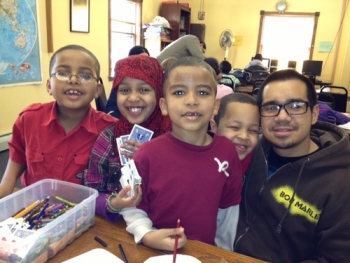 It was January 1st. I walked into the Brian Coyle Community Center in Cedar-Riverside around noon. At first glance it was like all of the other times I had been there before. But this time was different. This was not a community celebration or a neighborhood meeting; this was because of the devastating horror of an explosion and a fire that was still burning. Several groups were huddled in conversation, mostly in Somali, fire fighters and police officers were resting and warming up, the Red Cross was setting up to help and the Salvation Army was serving all beef hotdogs. Victims’ family members were beginning to arrive. And the news media was scrambling to get a story even though very little was known yet.
It was January 1st. I walked into the Brian Coyle Community Center in Cedar-Riverside around noon. At first glance it was like all of the other times I had been there before. But this time was different. This was not a community celebration or a neighborhood meeting; this was because of the devastating horror of an explosion and a fire that was still burning. Several groups were huddled in conversation, mostly in Somali, fire fighters and police officers were resting and warming up, the Red Cross was setting up to help and the Salvation Army was serving all beef hotdogs. Victims’ family members were beginning to arrive. And the news media was scrambling to get a story even though very little was known yet.
Everyone, it seemed, had a job to do or a task to complete, except for me. I was there to be a presence, a Christian presence in a predominantly Muslim community at a time of profound grief. But what does that mean when the community is known as “Little Mogadishu,” the largest concentration of Somalis outside of Somalia?
So often, as pastors, in difficult situations like this, we can fall back on what is familiar to our people and to us: words of comfort and hope we’ve said and heard many times; prayers we’ve prayed time and again; a pastoral role that is somehow understood by everyone in the room. But when the language in the room is Somali, when the women are wearing hijabs and some of the men are wearing thobes; and when the concept of “Christian” is not always a positive one, that is not necessarily so true.
What does it mean to be a Christian presence in a neighborhood where Christians are clearly in the minority, aware that the dominant message in the world these days is that we should be enemies, knowing that the conversation in which we are engaged is a fragile conversation?
I’m not sure and I have been at this a long time. But I have come to know a few things. Being a Christian presence in Cedar-Riverside means being here and often feeling inadequate and not particularly useful, and being ready to feel inadequate and useless for a long time. Being a Christian presence means letting go of any expectations and dreams of solving problems and fixing everything. It means letting the community lead and listening for ways we might, just might, be able to help. It means quietly realizing that being present and listening may be the real help that we can give this community. It means knowing that partners like Augsburg College, Fairview and the U of M, are also working to make our neighborhood the best it can be. Many thanks for their contributions.
But, mostly, it simply means that we are here, for the long haul, with no agenda other than to be here. It means trusting that somehow God is working through all of us in a way that is bigger than anything we will ever be able to comprehend. Accompaniment is the word for it these days.
And, then, at a meeting, in the midst of all of the messiness and uncertainty, Imam Sharif calls me sister, and I know I am where I am supposed to be.

